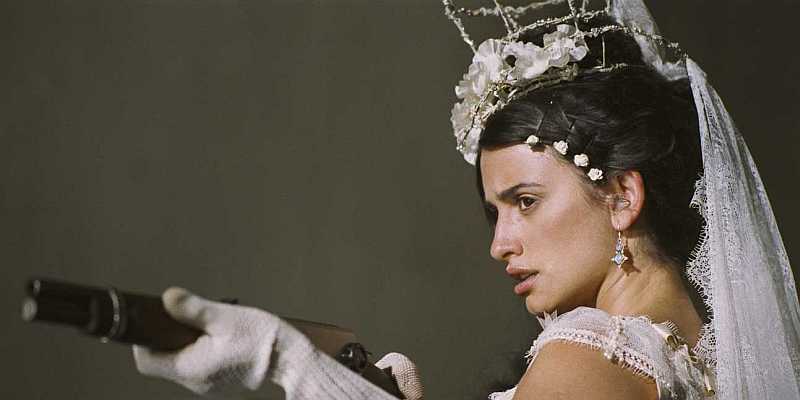 ★★★★
★★★★
“How the West was Wo(ma)n…”
 Let us make no mistake about this, this is a frothy confection of a film, which is not intended to be taken seriously; to do so, would be a serious mistake. The closest parallel here is probably to think of it as a distaff version of Shanghai Noon, with an odd couple teaming up for fun ‘n’ frolics in the Old West. Robber baron Tyler Jackson (Yoakam) comes to Mexico to take away land from the locals so a railroad can be built. In the process, he kills the fathers of both farm-girl Maria (Cruz) and rich-girl Sara (Salma), so he can take their property and bank respectively. To get revenge, each lady independently decides to rob the same bank at the same time, and are forced to team-up; their widely-disparate characters initially cause friction, but they eventally come to respect each other, after being trained by retired robber Bill Buck (Sam Shephard).
Let us make no mistake about this, this is a frothy confection of a film, which is not intended to be taken seriously; to do so, would be a serious mistake. The closest parallel here is probably to think of it as a distaff version of Shanghai Noon, with an odd couple teaming up for fun ‘n’ frolics in the Old West. Robber baron Tyler Jackson (Yoakam) comes to Mexico to take away land from the locals so a railroad can be built. In the process, he kills the fathers of both farm-girl Maria (Cruz) and rich-girl Sara (Salma), so he can take their property and bank respectively. To get revenge, each lady independently decides to rob the same bank at the same time, and are forced to team-up; their widely-disparate characters initially cause friction, but they eventally come to respect each other, after being trained by retired robber Bill Buck (Sam Shephard).
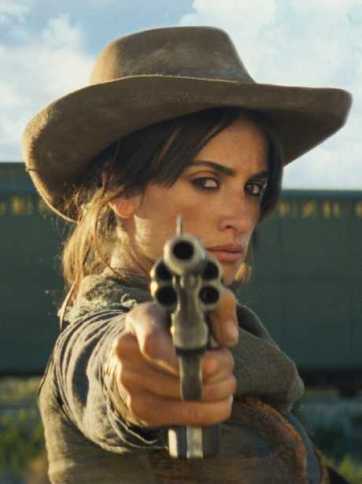 When they start their campaign, Jackson brings in a specialist in the new ‘scientific method’ of criminal investigation, Quentin (Zahn), to help track down the bandidas. However, after discovering Sara’s father was poisoned, heis convinced by the pair that he is actually working for the wrong side, and comes across to join them. The latest security measures are defeated – with the aid of a pair of ice-skates! – and as a result a train is loaded with the Mexican government’s gold reserve, to ship it to safety in Mexico. The bandidas resolve to take the cargo, but Jackson and his gang are waiting for them…as is Quentin’s fiancée…
When they start their campaign, Jackson brings in a specialist in the new ‘scientific method’ of criminal investigation, Quentin (Zahn), to help track down the bandidas. However, after discovering Sara’s father was poisoned, heis convinced by the pair that he is actually working for the wrong side, and comes across to join them. The latest security measures are defeated – with the aid of a pair of ice-skates! – and as a result a train is loaded with the Mexican government’s gold reserve, to ship it to safety in Mexico. The bandidas resolve to take the cargo, but Jackson and his gang are waiting for them…as is Quentin’s fiancée…
This was co-written by Luc Besson: he is the engine-room of European cinema, listed as a producer of no less than 60 titles over the past five years on the IMDB. He likely deserves a place in the Girls With Guns hall of fame, having directed Nikita and The Messenger, given Milla Jovovich and Natalie Portman their action-debuts in The Fifth Element and Leon respectively, worked as an uncredited co-producer on Haute Tension, and now delivers this. It came up in response to a request from the two leads, who’ve wanted to work together for a long time, and he handed the script to two Norwegians, making their feature debut [but with a lot of commercial experience].
However, there’s no doubt that it’s the leading ladies who make this one click, right from the first scene together, where Sara confronts Maria, who has snuck in to the house to argue with Sara’s father about the ongoing land-grab. The bickering between the two, which continues, in an increasingly friendly way, through the entire film. Maria snipes at Sara because the latter can’t fire a gun to save her life – in a beautiful touch, she gets terrible hiccups when she tries; Sara taunts Maria for her lack of education.
The two also argue over who is the best kisser, notably in a scene where they are dressed as Paris showgirls, and are trying to extract information from Quentin, who is tied to the bed. And Steve Zaun was actually paid to take part? ;-) That’s about as far as the film goes, sexually speaking; much cleavage, but no actual nudity. A fondness for the heroines splashing around in water, especially early on, and the above-mentioned comedic seduction scene, is about as close as we get to exploitation. That news may disappoint some readers, but it really wouldn’t be in keeping with the overall tone of the movie, which is light-hearted and firmly PG-13 rated, despite lesbian scuttlebutt which circulated afte a press conference where Penelope (gasp!) touched Salma’s butt.
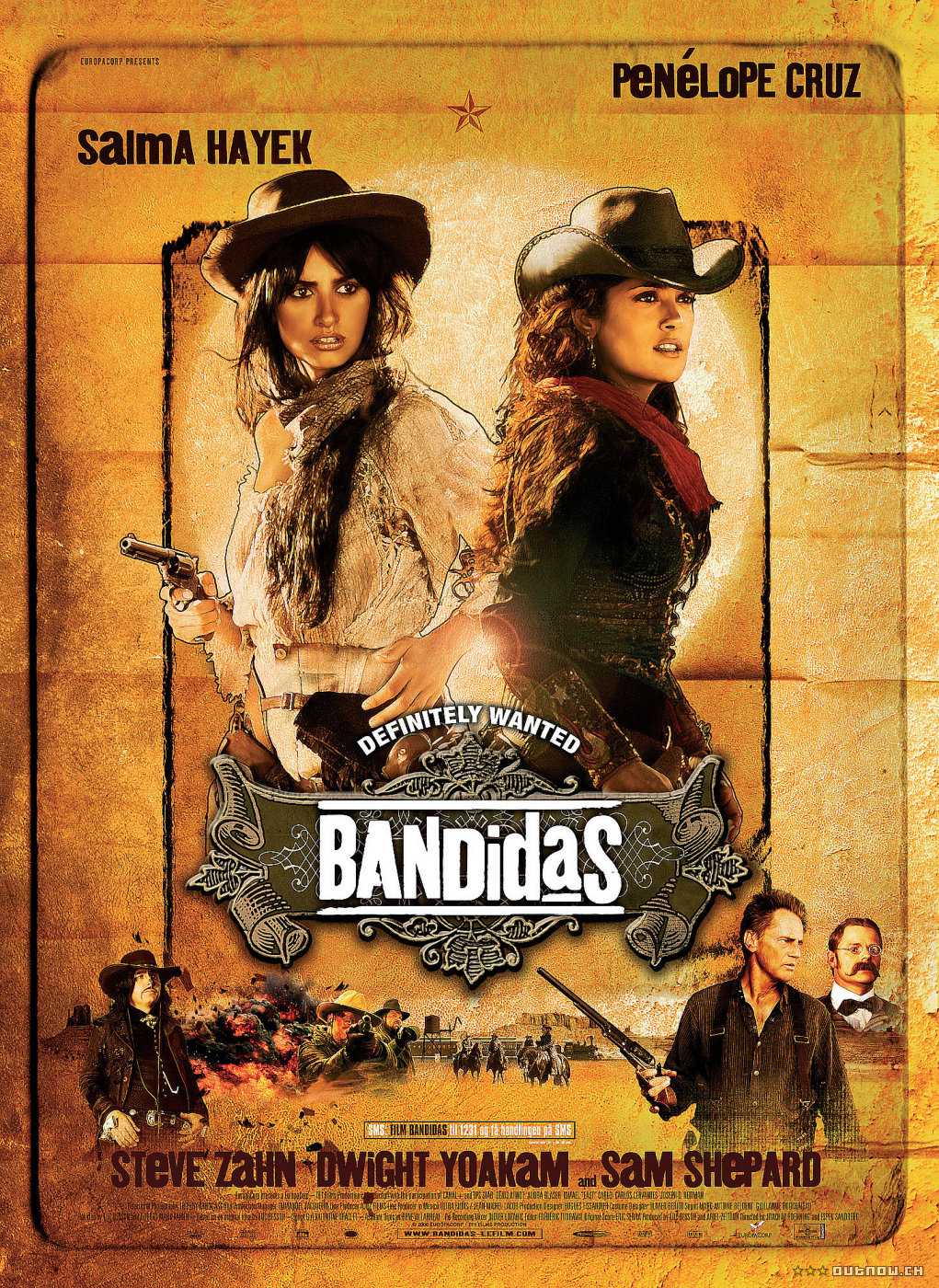 What did disappoint me was the action. I expected more from Besson, who helped give us such gems as The Transporter and District B-13, as well as the titles mentioned above, though a couple of moments stand out. There’s a bravura slow-motion scene in the final battle – bullets, knives, bodies and debris fly in a single shot, the camera panning back and forth to capture the carnage. But, the most amazing part is seeing a horse, with a rider on its back, climb a ladder. This was apparently a combination of training (the horse, with a stunt rider, walked up a specially-made set of stairs) and CGI work by Parisian FX house Macguff, to replace the stairs with a ladder, add dust and bounce, etc. It’s a throwaway moment, in a throwaway film, but is worthy of note, and applause.
What did disappoint me was the action. I expected more from Besson, who helped give us such gems as The Transporter and District B-13, as well as the titles mentioned above, though a couple of moments stand out. There’s a bravura slow-motion scene in the final battle – bullets, knives, bodies and debris fly in a single shot, the camera panning back and forth to capture the carnage. But, the most amazing part is seeing a horse, with a rider on its back, climb a ladder. This was apparently a combination of training (the horse, with a stunt rider, walked up a specially-made set of stairs) and CGI work by Parisian FX house Macguff, to replace the stairs with a ladder, add dust and bounce, etc. It’s a throwaway moment, in a throwaway film, but is worthy of note, and applause.
That may be perhaps down to the leads’ lack of experience: Cruz’s only real brush with the action genre was Sahara, Hayek has more background (working with Robert Rodriguez helps there), but neither of them would appear to be looking to make a name for themselves with their work here. A sequel is hinted at by the ending; however, that this $30m production went all but straight to video in the US and notched only $18m overseas would seem to rule this out. One wonders why, for a film set in Mexico and with two Hispanic leads, why they didn’t speak Spanish; one assumes Besson, with his eye on the international market, went for the more commercial English, even though Cruz seems slightly ill-at-ease thee.
These qualms are relatively minor, and if not the all-out action fest I was hoping for, it’s certainly among the best Westernettes of recent years. This is not a genre which has been kind to action heroines in the past, including such bombs – justifiable or not – as Bad Girls and The Quick and the Dead, as well as less high-profile turkeys as Gang of Roses. Bandidas is nowhere in the same league, and if survives almost entirely on the charisma and energy of Cruz and Hayek, that’s by itself is something which most movies would like to have. If you can certainly argue that to some extent this is a vanity project, here, I’d be very hard pushed to call vanity a sin.
Dir: Joachim Rønning and Espen Sandberg
Stars: Penelope Cruz, Salma Hayek, Steve Zahn, Dwight Yoakam
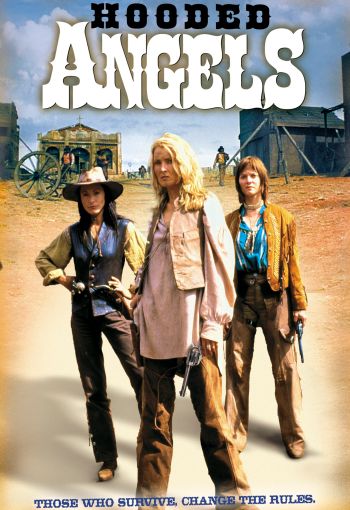 At the end of the Civil War, marauding gangs rage through Texas, raping and killing. The victims of one such raid fight back; three years later, they have become the Hooded Angels, a notorious and feared group of bank robbers led by Hannah (Stander). But on their tail is Wes (Johansson), whose father was an innocent victim in their original battle. He and his friends catch up with the women in a town where they’re plotting their next raid and, with painful inevitably, love blossoms between Wes and Hannah.
At the end of the Civil War, marauding gangs rage through Texas, raping and killing. The victims of one such raid fight back; three years later, they have become the Hooded Angels, a notorious and feared group of bank robbers led by Hannah (Stander). But on their tail is Wes (Johansson), whose father was an innocent victim in their original battle. He and his friends catch up with the women in a town where they’re plotting their next raid and, with painful inevitably, love blossoms between Wes and Hannah.




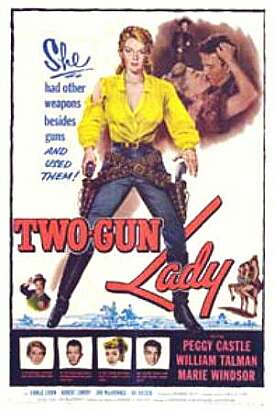
 Trick-shot artist Kate Masters (Castle) comes to a remote town with her show, raising suspicions among locals, who suspect she’s more than she seems. They are led by Jud Ivers (McDonald) and his family, who rule the area with an iron grip. This 1955 B-movie (in the original sense – it’s only 71 minutes long) crams plenty in, with almost everyone having secrets, good or bad. Castle makes a fine heroine, exuding strength but ultimately vulnerable, and is matched by the rest of the cast. Particular credit to McDonald, and Jennifer Jason Leigh’s mother, Barbara Turner, in her movie debut as Jenny Ivers; both bring depth to what could be one-dimensional characters.
Trick-shot artist Kate Masters (Castle) comes to a remote town with her show, raising suspicions among locals, who suspect she’s more than she seems. They are led by Jud Ivers (McDonald) and his family, who rule the area with an iron grip. This 1955 B-movie (in the original sense – it’s only 71 minutes long) crams plenty in, with almost everyone having secrets, good or bad. Castle makes a fine heroine, exuding strength but ultimately vulnerable, and is matched by the rest of the cast. Particular credit to McDonald, and Jennifer Jason Leigh’s mother, Barbara Turner, in her movie debut as Jenny Ivers; both bring depth to what could be one-dimensional characters.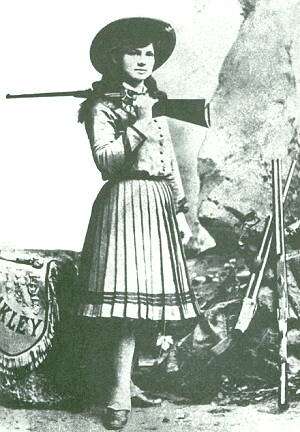 Annie Oakley was one of the earliest “girls with guns”. In her role as a sharpshooter, performing with the likes of Buffalo Bill’s Wild West show, she travelled the globe, appearing in front of Presidents, Kings and Emperors. She shot a cigarette held by the future Kaiser Wilhelm of Germany (accuracy later deplored by American newspapers, after the nations went to war in 1917). At 90 feet, she could shoot a dime tossed in midair, or hit the
Annie Oakley was one of the earliest “girls with guns”. In her role as a sharpshooter, performing with the likes of Buffalo Bill’s Wild West show, she travelled the globe, appearing in front of Presidents, Kings and Emperors. She shot a cigarette held by the future Kaiser Wilhelm of Germany (accuracy later deplored by American newspapers, after the nations went to war in 1917). At 90 feet, she could shoot a dime tossed in midair, or hit the  ★★★★
★★★★ When they start their campaign, Jackson brings in a specialist in the new ‘scientific method’ of criminal investigation, Quentin (Zahn), to help track down the bandidas. However, after discovering Sara’s father was poisoned, heis convinced by the pair that he is actually working for the wrong side, and comes across to join them. The latest security measures are defeated – with the aid of a pair of ice-skates! – and as a result a train is loaded with the Mexican government’s gold reserve, to ship it to safety in Mexico. The bandidas resolve to take the cargo, but Jackson and his gang are waiting for them…as is Quentin’s fiancée…
When they start their campaign, Jackson brings in a specialist in the new ‘scientific method’ of criminal investigation, Quentin (Zahn), to help track down the bandidas. However, after discovering Sara’s father was poisoned, heis convinced by the pair that he is actually working for the wrong side, and comes across to join them. The latest security measures are defeated – with the aid of a pair of ice-skates! – and as a result a train is loaded with the Mexican government’s gold reserve, to ship it to safety in Mexico. The bandidas resolve to take the cargo, but Jackson and his gang are waiting for them…as is Quentin’s fiancée… What did disappoint me was the action. I expected more from Besson, who helped give us such gems as The Transporter and District B-13, as well as the titles mentioned above, though a couple of moments stand out. There’s a bravura slow-motion scene in the final battle – bullets, knives, bodies and debris fly in a single shot, the camera panning back and forth to capture the carnage. But, the most amazing part is seeing a horse, with a rider on its back, climb a ladder. This was apparently a combination of training (the horse, with a stunt rider, walked up a specially-made set of stairs) and CGI work by Parisian FX house Macguff, to replace the stairs with a ladder, add dust and bounce, etc. It’s a throwaway moment, in a throwaway film, but is worthy of note, and applause.
What did disappoint me was the action. I expected more from Besson, who helped give us such gems as The Transporter and District B-13, as well as the titles mentioned above, though a couple of moments stand out. There’s a bravura slow-motion scene in the final battle – bullets, knives, bodies and debris fly in a single shot, the camera panning back and forth to capture the carnage. But, the most amazing part is seeing a horse, with a rider on its back, climb a ladder. This was apparently a combination of training (the horse, with a stunt rider, walked up a specially-made set of stairs) and CGI work by Parisian FX house Macguff, to replace the stairs with a ladder, add dust and bounce, etc. It’s a throwaway moment, in a throwaway film, but is worthy of note, and applause.











